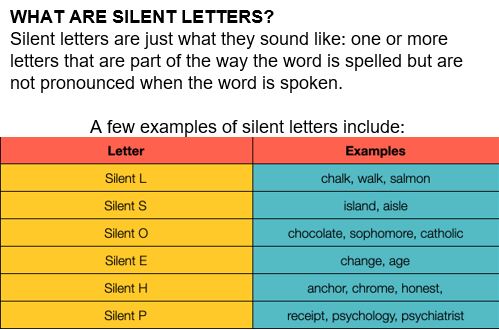Difference between revisions of "Language/English/Pronunciation/Silent-Letters"
< Language | English | Pronunciation
Jump to navigation
Jump to search
m (Quick edit) |
|||
| (2 intermediate revisions by 2 users not shown) | |||
| Line 1: | Line 1: | ||
<div | <div class="pg_page_title"> HOW DO SILENT LETTERS WORK?</div> | ||
[[File:Silent words.jpg|center]] | [[File:Silent words.jpg|center]] | ||
<youtube>nUccn2K0fjw</youtube> | <youtube>nUccn2K0fjw</youtube> | ||
<youtube>Wprp1N2srIw</youtube> | |||
There aren't any particular rules, but there are common combinations that create silent letters. | |||
Here are some examples: | |||
* B after M or before T (e.g., dou'''bt''' or cru'''mb''') | * B after M or before T (e.g., dou'''bt''' or cru'''mb''') | ||
* C after S in some words (e.g., '''sc'''issors or a'''sc'''ent) | * C after S in some words (e.g., '''sc'''issors or a'''sc'''ent) | ||
| Line 19: | Line 18: | ||
* P before S, T, or N (e.g., '''ps'''ychic, recei'''pt''', or '''pn'''eumonia) | * P before S, T, or N (e.g., '''ps'''ychic, recei'''pt''', or '''pn'''eumonia) | ||
* T before S in the middle of a word (e.g., ca'''st'''le or li'''st'''en) | * T before S in the middle of a word (e.g., ca'''st'''le or li'''st'''en) | ||
* W before R or sometimes after S (e.g., '''wr'''ite or '''sw'''ord) | |||
==Other Lessons== | |||
* [[Language/English/Pronunciation/Alphabet-and-Pronunciation|Alphabet and Pronunciation]] | |||
* [[Language/English/Pronunciation/How-to-Pronounce-R|How to Pronounce R]] | |||
* [[Language/English/Pronunciation/Can't-versus-can-in-American-English|Can't versus can in American English]] | |||
* [[Language/English/Pronunciation/How-to-Pronounce-H|How to Pronounce H]] | |||
* [[Language/English/Pronunciation/How-to-Pronounce-THE|How to Pronounce THE]] | |||
<span links></span> | |||
Latest revision as of 23:30, 26 March 2023
HOW DO SILENT LETTERS WORK?
There aren't any particular rules, but there are common combinations that create silent letters.
Here are some examples:
- B after M or before T (e.g., doubt or crumb)
- C after S in some words (e.g., scissors or ascent)
- G before N (e.g., gnat or foreign)
- K before N (e.g., knee or knowledge)
- N after M (e.g., hymn or column)
- P before S, T, or N (e.g., psychic, receipt, or pneumonia)
- T before S in the middle of a word (e.g., castle or listen)
- W before R or sometimes after S (e.g., write or sword)
Other Lessons[edit | edit source]
- Alphabet and Pronunciation
- How to Pronounce R
- Can't versus can in American English
- How to Pronounce H
- How to Pronounce THE
